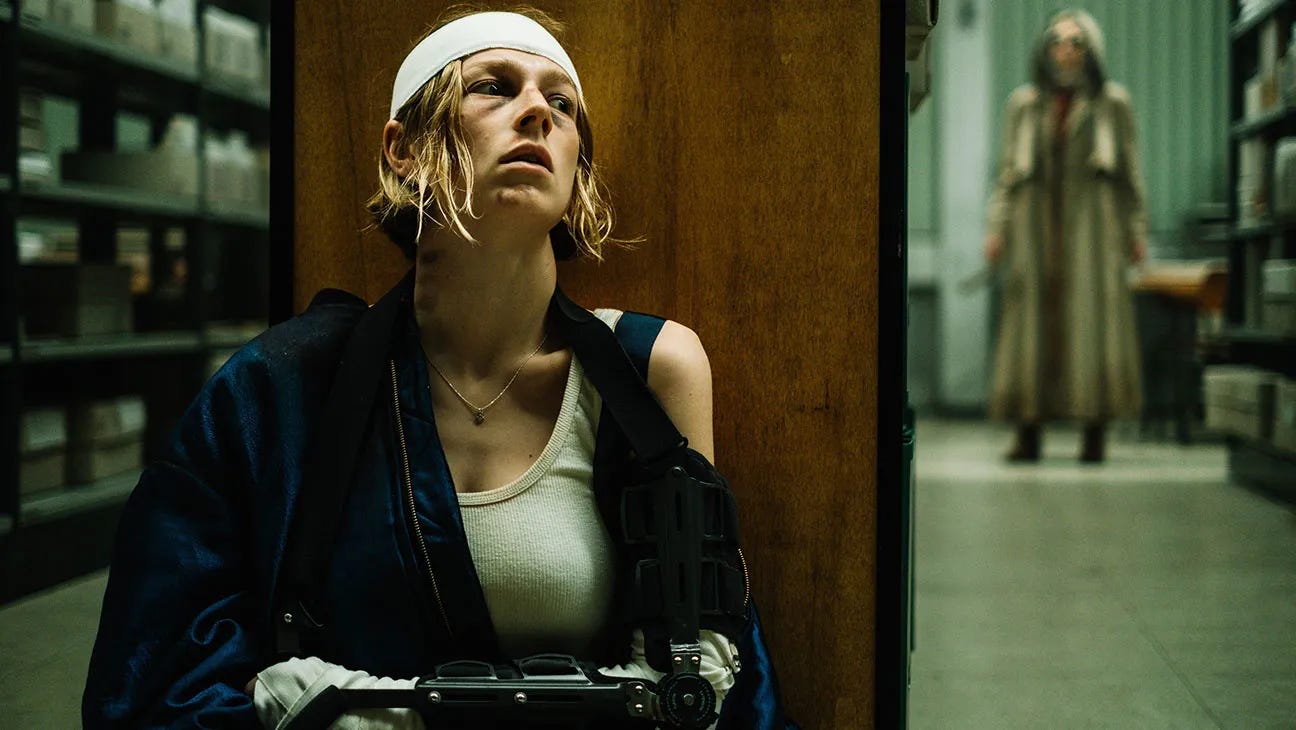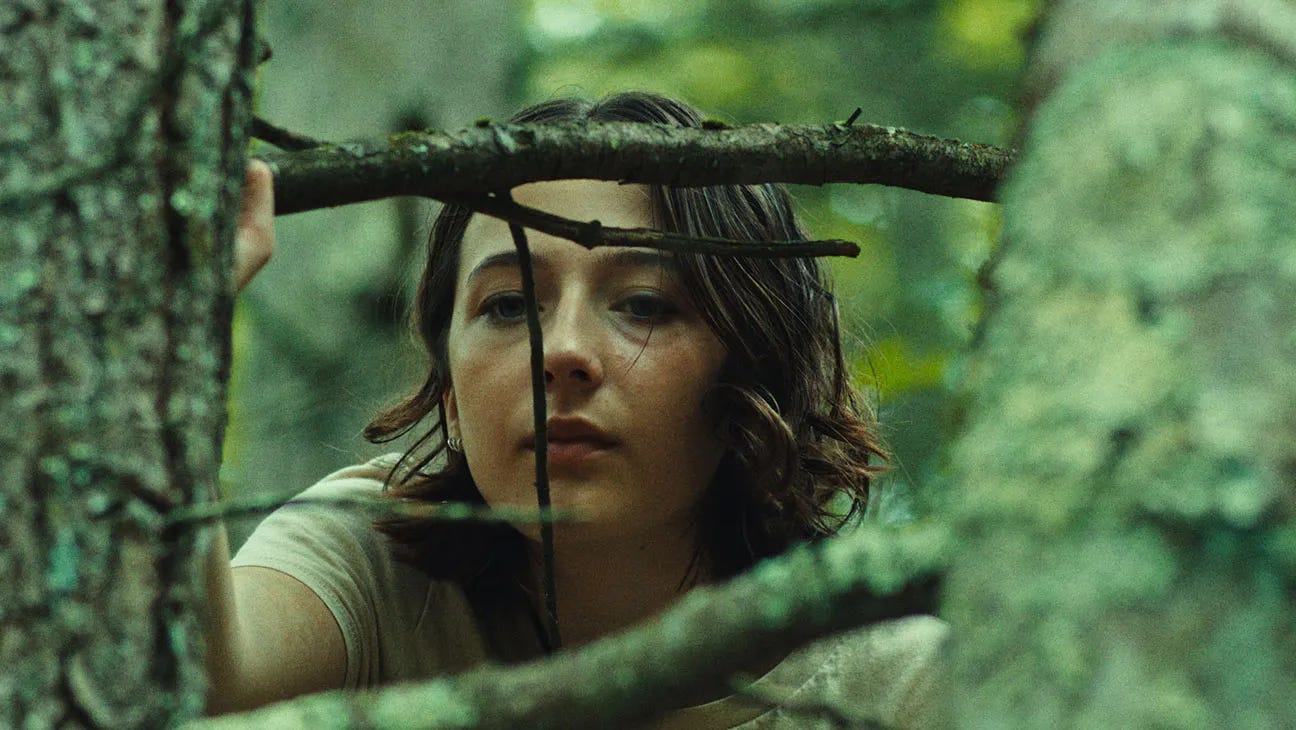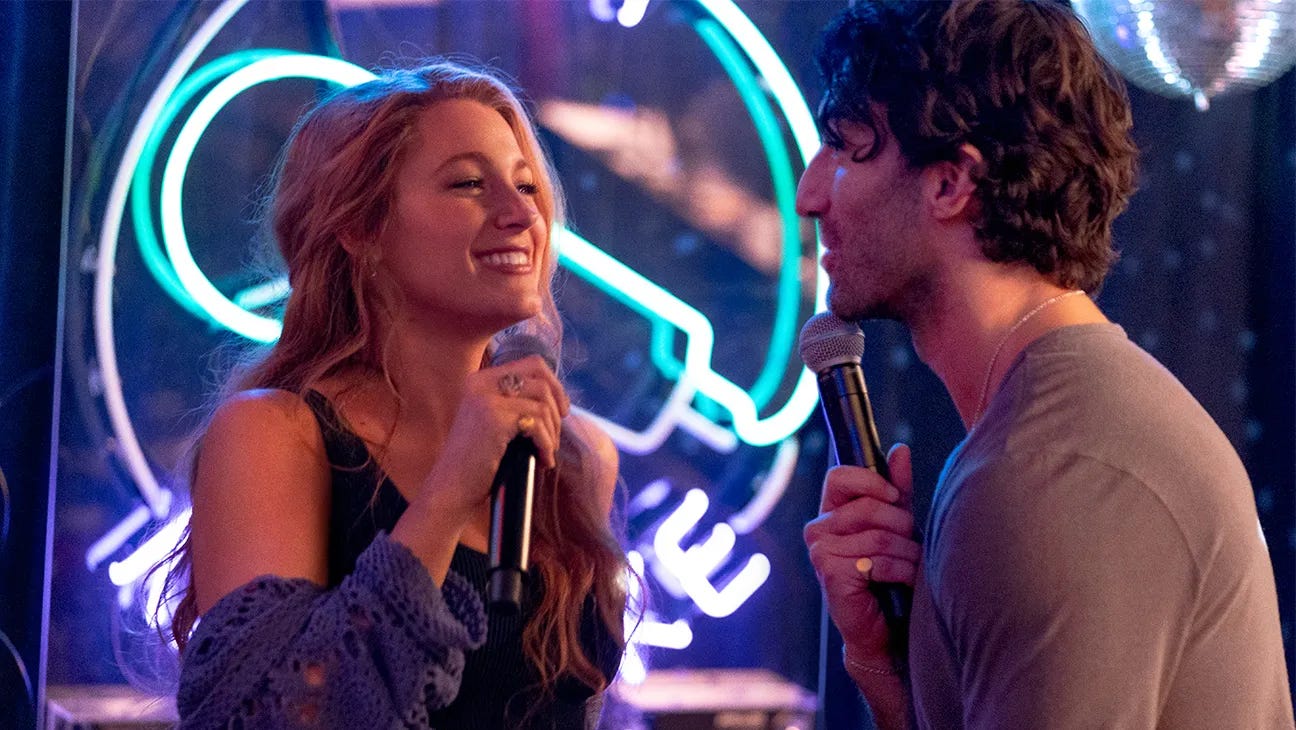In Review: 'Cuckoo,' 'Good One,' 'It Ends With Us'
Two teenagers experience two different family getaways in a bizarre new horror film and Sundance-favorite feature debut. Elsewhere, a florist attempts to escape a cycle of abuse.
Cuckoo
Dir. Tilman Singer
103 min.
The funniest moment of Cuckoo, one of several in this deliriously zonked-out Euro-horror movie, is a flailing-arms gesture from our heroine, Gretchen (Hunter Schafer), an American teenager waylaid at a strange hotel in the German Alps. The gesture says: Can’t you people see what’s going on here? What the fuck is this? And that, in a nutshell, is what it’s like to watch Cuckoo, which tosses Gretchen (and us) into a freaky off-off-off season resort and isn’t in any hurry to clarify the weird threats that sting the senses like that crisp mountain air. Then when it does get around to explaining what we’re witnessing, the internal logic of it still seems hard to fully understand, as if the information were reaching us through a frayed electrical wire. The German writer-director, Tilman Singer (Luz), makes Gretchen’s disorientation the film’s central force.
For reasons the film holds off on explaining, Gretchen has been sent to live with her estranged father Luis (Marton Csokas) just as he and his current family—second wife Beth (Jessica Henwick) and their mute young daughter Alma (Mila Lieu)—are pulling up stakes for Bavaria. Luis and Beth are friendly with the resort’s proprietor, Mr. König (Dan Stevens), an exuberantly sinister man who greets them with unnerving cheeriness. Herr König wants the couple to redesign the hotel to peculiar new specifications and he attempts to mollify the skeptical Gretchen by offering her a job at reception. It’s an easy gig for Gretchen, in that very few people seem to claim the resort’s many vacancies, but she witnesses some alarming behavior by those who do. One night, as she pedals home on her bike, she’s attacked by a screeching figure that doesn’t seem altogether human.
Singer seems aware of the classics: The remote, dated, lightly occupied mountain resort evokes The Shining while Gretchen’s lonely, terrifying odyssey in Germany puts her in line with Jessica Harper in Suspiria, penned into a haunted locale that starts to feel like a trap laid just for her. The bird of the title does figure into the scheming at play here, and doubles as a vague reference to the sort of tangled family tree on whose branches Gretchen finds herself perched. Singer stages his shock scenes with an avian quality, too, with flutters of movement (and time) and quick, slashing bursts of violence. Schafer plays Gretchen as a seemingly disaffected teen who’s in fact extremely affected, but it’s Stevens who runs away with Cuckoo. Stevens played the eccentric villain type to unforgettable effect a decade ago in Adam Wingard’s The Guest, and his Mr. König is a genuine hoot, at times creepily accommodating and at others so consumed by his diabolical agenda that the mask drops. It’s hard to say for sure what he’s up to or why—Singer can be frustratingly murky on this point—but it’s unsettling all the same. — Scott Tobias
Cuckoo opens everywhere tonight.
Good One
Dir: India Donaldson
89 min.
At the end of Good One, writer-director India Donaldson’s striking feature debut, it’s not clear how Sam (Lily Collias), a college-bound New York teenager, will describe the weekend she just spent with her father Chris (James Le Gros) and his best friend Matt (Danny McCarthy) hiking in the Catskills. On the surface, nothing that much happened: they spent a few days navigating challenging terrain, ran into a trio of fellow campers a little older than Sam but considerably younger than her dad and his pal, and took in views gorgeous enough to offset the annoyance of leaving her girlfriend behind, sharing a tent with her father, using the bathroom outdoors, and having to pack enough tampons to last the whole trip. And maybe that’s all she’ll say about it. Not everyone needs to know it was the weekend where she started to see the world a little more clearly, a bit more sadly, and with a touch more anger than before. Chris and Matt both comment about how wise she is, but the acquisition of wisdom isn’t always easy or pretty.
The events of the film don’t lend themselves to easy description. The one moment that might count as a dramatic incident—a single line of dialogue— keeps so close to the film’s low-key rhythms that you might at first wonder if you heard what you think you heard. But by the time it arrives, Donaldson has already established that the film’s real drama won’t play out in dialogue or action so much as in the changes in expression that cross Sam’s face.
As Chris and Matt go on and on about their lives—mostly complaining, occasionally fondly remembering the past—Sam reacts wordlessly but unmistakably, even if her companions don’t see the effect their words and actions have,or just choose to ignore it. (At this point it’s worth mentioning that Collias, whose only other feature credit is a small role in last year’s Palm Trees and Power Lines is really good.) Sam’s happy to razz her dad—who left her mother and is now the father of a newborn at 60—and Matt—a sometime actor, sometime sales instructor—and be razzed back. She lovingly makes fun of their age and habits and undercuts their delusions, particularly Matt’s description of divorce just kind of happening to him. But she’s also smart enough to pick up on the power dynamics beneath the threesome and how, when the razzing stops, she might not be receiving the same respect she offers.
Good One bears the unmistakable influence of Kelly Reichardt, most obviously Reichardt’s 2006 film Old Joy, another story of painful realizations arrived at over the course of a hiking trip. It’s evident in other ways, too. Donaldson similarly has the confidence to let her scenes play out at length and to focus on seemingly inconsequential moments trusting viewers to put them together later. But Good One has a wry, melancholy moodiness all its own. The disappointment that hangs over Sam’s weekend is deepened by the fact that she loves her father and Matt—though a narcissistic mess—is pretty entertaining company, too. She wants to be with them until it becomes clear they’re part of what she’ll have to leave behind. —Keith Phipps
Good One opens in select theaters tomorrow and will expand in the upcoming weeks.
It Ends With Us
Dir. Justin Baldoni
130 min.
It Ends With Us is the sort of film whose backstory can make criticism feel a bit like bullying. An adaptation of Colleen Hoover’s 2016 novel, it’s the story of an abusive relationship inspired by Hoover’s mother, who walked away from her father after years of abuse. A bestseller (and then some), the novel clearly struck a chord with readers, some of whom undoubtedly saw reflections of their own lives in its pages. As the film’s protagonist Lily says of abuse, it’s something that’s not talked about. Talking about it has clearly meant a lot to Hoover and her fans.
Earnestness and openness, however, doesn’t always alchemize into commendable filmmaking. Or at least it doesn’t in this Justin Baldoni-directed adaptation, an uneasy mixture of gloss, head-spinning plot twists, and genuinely affecting moments. Most of the latter can be attributed to star Blake Lively, who’s given the seemingly impossible task of making her character charming, smart, and strong-willed but also believably vulnerable. It’s a rich, complicated bit of acting in the middle of a film that too often doesn’t meet the performance on its level.
Lively plays Lily, who, as the film opens, has returned to Maine from Boston to bury her father (Kevin McKidd), her small town’s beloved mayor. Lily’s feelings are complicated, to put it mildly. After leaving the funeral mid-eulogy, she returns to Boston where, while attempting to grieve privately after sneaking onto the rooftop deck of a high-end apartment building, she meets Ryle Kincaid (Baldoni, doing double duty in front of and behind the camera), a neurosurgeon who enters her life kicking a chair in anger. This, in literary terms, is what’s called foreshadowing. In nearly every way except the lead performance, it’s a thuddingly unsubtle film.
To be fair, It Ends With Us acknowledges this freely. At this point, it’s worth noting that Lily not only has the full name of “Lily Blossom Bloom,” she has a lifelong dream of opening a flower shop and that Ryle has a gym-sculpted body that suggests he goes directly from the operating room to the treadmill. These details are notable not because they’re ridiculous (though they are) but because the film keeps pointing out they’re ridiculous, making frequent reference to both in what seems like an odd attempt to defuse eyerolls by beating the audience to them. And weirdly enough, it works for a while. Even with these details, and the fact that Ryle seems like a menacing creep from the moment he appears on screen, It Ends With Us remains a handsomely shot (largely on location in Boston) and involving drama for a good stretch. Flashing back from Lily’s present to her teen years (where she’s played by Isabela Ferrer, in another strong performance), the film parses out the story of her first love, when she first fed then fell for Atlas Corrigan (played as a teen by Alex Neustaedter and as an adult by Brandon Sklenar), a fellow high school student who’d fled home and begun living in the abandoned house next door.
It’s when It Ends With Us tries to bring all the strands together that it runs into trouble. Atlas’s unexpected reentry into Lily’s life catalyzes Ryle’s anger. As Lily struggles with her feelings for the two men, his abuse, which she’d at first tried to dismiss as accidents and isolated incidents, grows worse. The film’s attempts to do double duty as a soapy love story and a tale of abuse pull it in two directions at once. It feels like too heavy a topic for what’s a fundamentally lightweight film, particularly once it becomes clear that Lily is the only three-dimensional character in the piece, an element made even worse by an attempt to explain Ryle’s behavior away as the result of childhood trauma. Jenny Slate has some good moments as Lily’s flighty best friend/Ryle’s sister but Sklenar plays the grown-up Atlas as an only slightly less menacing option than Ryle. Again, the film’s heart seems very much in the right place. But when has that been enough? —Keith Phipps
It Ends With Us opens in theaters tonight.











One other IT ENDS WITH US THING from the press kit: Part of the scripting process involved seeking notes from a collection of Colleen Hoover superfans to make sure it met their approval. This included the choice of whether or not to include the line "It ends with us" in the dialogue, which the fans apparently ultimately decided. (You'll have to see the movie to find out it if it made it but take a guss.) All this is outside the scope of the review. You write about what's on screen not about how it got there. But it's still pretty interesting.
Hollywood must have driven several dump trucks full of money to Dan Stevens's house to try to tempt him to be the generic handsome lead in yet another bland rom com. He'd probably have private island money if he'd just gone with the flow and had Matthew McConnaughey's career circa 1995-2005. Thank god he is much interesting and weirder than that. (And of course I mean "weird" as the absolute highest compliment.) Seeing Cuckoo this weekend, super excited.